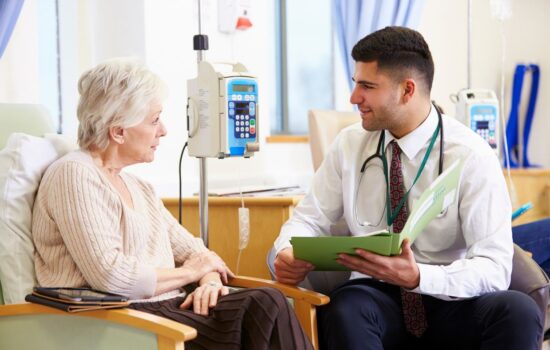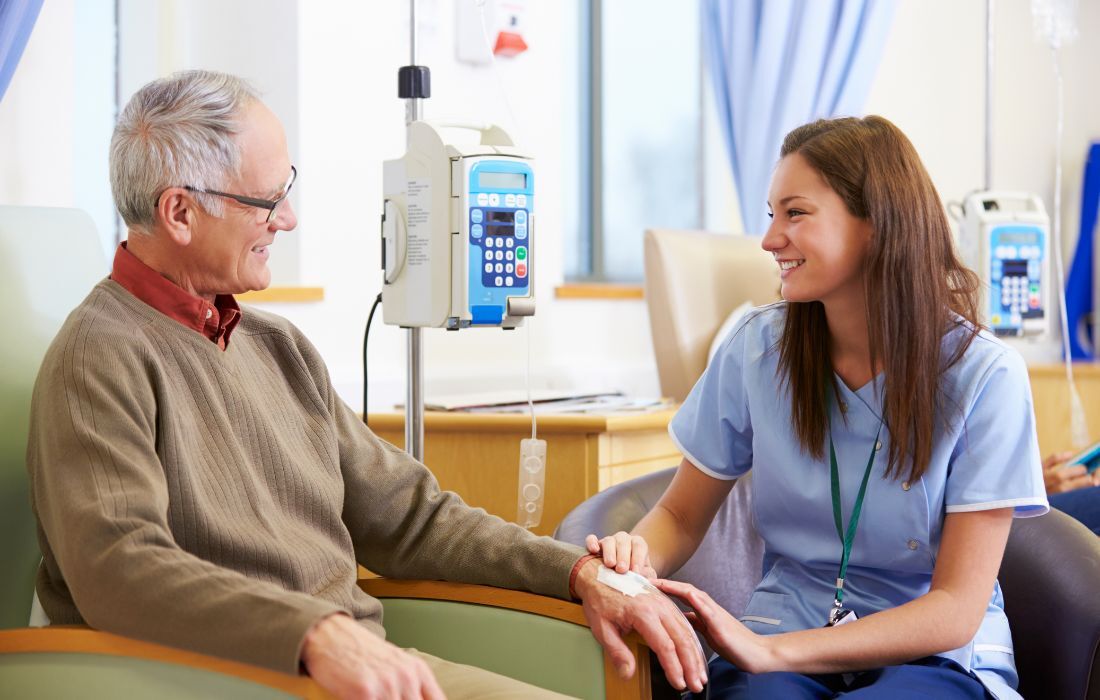October 2, 2024
Managing Side Effects of FOLFOX for Colorectal Cancer Treatment

It is common for colon and rectal cancers (colorectal cancers) to be treated with chemotherapy. It’s a systemic drug that reaches not only the tumor but also cancer cells circulating throughout the abdomen, lymph system, and other areas of the body.
A combination of chemotherapy drugs referred to as FOLFOX is commonly used for treating colorectal cancer. These drugs tend to cause some side effects in patients. However, the specific impact on each patient is different based on age, the extent of cancer (stage), and overall health.

Let’s take a look at what to expect from FOLFOX chemotherapy so you can prepare.
Side Effects to Expect From FOLFOX
FOLFOX treatment involves a 48-hour infusion of several drugs, making it more intense than other chemotherapy treatments. As a result, it often leads to a broader range of side effects. While most side effects are temporary, some may last longer or become permanent.
Fatigue
Fatigue is the most commonly experienced side effect of FOLFOX. It can be an overwhelming exhaustion that limits your daily activities. Surgery and radiation could also contribute to this fatigue. You may need to take frequent breaks, rest when needed, and seek help from friends or family to manage daily tasks.
What you can do:
When possible, engage in physical activity to boost your energy levels, even in short bursts. Exercise can also enhance your physical and mental strength. Consuming nutritious, well-balanced meals, snacks, and caffeine-free beverages can also help combat fatigue.
It's important to understand that your energy levels may be lower until the treatment is completed. Normal energy levels typically return over time, but the recovery period can vary among patients, so be patient and kind to yourself.
Loss of Appetite
Chemotherapy can decrease your appetite and alter the way food tastes and smells. If you experience nausea and vomiting, you may not feel like eating, which can lead to dehydration if your body is unable to absorb the liquid from foods. If this happens, your doctor might recommend a hydration IV.
What you can do:
Eating foods that are easy to digest and staying well-hydrated to prevent dehydration can make your treatment and recovery less challenging.
To prepare for a potential loss of appetite, stock up on healthy foods and beverages. Between meals, eating smaller meals and healthy snacks like yogurt, hummus, and pudding can be helpful.
Immune System Problems
Chemotherapy can weaken your immune system by damaging cancerous and healthy cells, including immune system cells, increasing your risk of infections. Colorectal cancer patients are particularly susceptible to mucositis, a painful inflammation of the digestive tract.
What you can do:
To prepare for immune system issues, discuss the risk of developing mucositis with your colorectal cancer doctor before starting treatment. You may be prescribed filgrastim to boost your body's white blood cell production. Also, remember to wash your hands regularly, avoid contact with sick individuals and crowded places, and maintain a nutritious diet to keep your immune system as strong as possible.
Sensitivity to Hot and Cold Temperatures
The FOLFOX chemotherapy drugs can cause nerve damage, particularly in the hands and feet. This is called peripheral neuropathy. The nerves may cause sensations of tingling, burning, or numbness, and most patients have an increased sensitivity when touching cold or warm items.
What you can do:
To manage neuropathy, you can take several steps. Wear clothing made of materials like cotton and bamboo to help regulate body temperature and increase comfort. Compression socks, sleeves, and gloves can help improve blood circulation. Keep gloves or a hot pad near the refrigerator to protect your hands when handling cold items. Pick up warm mugs carefully or with a hot pad.
Thinning Hair
Thinning hair is a common side effect of FOLFOX treatment, but it is usually temporary. Your hair will most likely regrow after the treatment ends.
What you can do:
To prepare for potential hair thinning, brush your hair and scalp gently, use a mild shampoo, reduce hair washing frequency, use conditioner, use a silk pillowcase, and avoid hair dryers. Since your head may feel sensitive to cold during FOLFOX treatments, be sure you have hats to wear, even indoors with air conditioning.
Skin Changes
Chemotherapy treatment may result in changes to your skin, such as dryness or rashes, and increased sensitivity to the sun, leading to easier sunburns.
What you can do:
To address these skin issues, use high-factor sunscreen and regularly apply unscented moisturizer.
Anemia
Like most types of chemotherapy, FOLFOX chemotherapy often causes anemia. A decrease in red blood cells can lead to weakness and dizziness.
What you can do:
Your colorectal cancer specialist will monitor your blood before and possibly after each treatment. If your red blood cell count is too low, you may need a transfusion. If it's not too low, get plenty of rest, stand up slowly, and have assistance when moving around if needed. Also, consume an iron-rich diet to help increase your red blood cell count. A diet high in iron includes foods such as lean red meats, cooked spinach, nuts, and eggs.
Gastrointestinal Issues
Chemotherapy can affect your digestion. Follow your oncologist’s advice on what to eat during and after your chemotherapy treatments. Focus on getting the nutrients you need, even if you experience stomach issues like nausea and vomiting.
Many patients experience changes in bowel movements, including constipation and diarrhea, which may be related to surgery. Other gastrointestinal side effects may include gas, bloating, and cramping.
What you can do:
Fill your pantry and fridge with the recommended foods to help manage the effects of chemo treatments. Drink plenty of fluids, but be selective. Avoid sugary soft drinks and artificial fruit juices. Instead, stick with water, 100% fruit juices, drinks with electrolytes, and other non-caffeinated beverages. Coffee, strong tea, caffeinated drinks, and alcohol can cause dehydration, so skip those as often as possible. Choose mild foods and avoid fried, greasy, or spicy foods. If you’re nauseous, eat and drink slowly.
Maintain good posture and sit upright for two hours after eating. Keep over-the-counter stool softeners and laxatives on hand. You can also talk to your doctor about anti-diarrhea and anti-nausea medicines.
Mouth Sores
Chemotherapy can cause sores on the soft tissue inside your mouth, such as the tongue, cheeks, lips, and gums, making it hard to eat and speak.
What you can do:
Your doctor may prescribe a protective coating solution to help with pain. Simple steps like good dental hygiene, not smoking, and eating a balanced diet can also help.
FOLFOX Colorectal Cancer Treatment Could Cause Long-Term Side Effects
Side effects usually improve after treatment, but some, like neuropathy, can be long-lasting. Fatigue and bowel problems could last up to a year after treatment, especially depending on the type of surgery that was needed. Physical therapy may be recommended to manage these effects.
Personalized Colorectal Cancer Care and Treatment in Brevard County, Florida
If you've been recently diagnosed with colorectal cancer or any other GI cancer, it's important to have a personalized treatment plan and know what to expect from your treatments.
Cancer Care Centers of Brevard offers advanced cancer treatment for GI cancers, including colon and rectal cancers, in various areas in Florida, including Melbourne, Merritt Island, Palm Bay and Rockledge. Schedule a consultation with one of our experienced oncologists today.
Categories: Colorectal Cancer